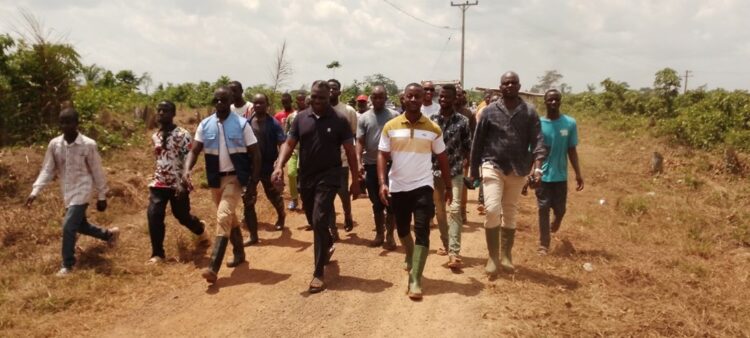By: Austin S. Fallah – A True Son of Liberia, Africa, and the Planet Earth Soil.
In the heart of West Africa, Liberia, a nation with a storied past, stands at a crossroads. As a society, it is incumbent upon us to address the systemic issues woven into our nation’s tapestry.
Our immediate history, tainted by civil war and economic instability, casts a long shadow over Liberia’s potential.
Among the paramount steps Liberia must undertake to alter its destiny is the elevation and expansion of its middle class.
It is fundamental to the nation’s progress to emancipate itself and its citizens from the dungeons of poverty, shrink the economic gaps widened by foreign dependence, and diminish the attractiveness of corruption and reliance on handouts.
An equitable distribution of state resources is not just an ideal.
It is a necessity for establishing an environment where education is paramount, and an educated society can liberate itself from the shackles of poverty.
The idea of cultivating a middle class is not merely an economic objective.
It is a transformative vision aimed at redefining the essence of Liberia.
For far too long, the country has been caught in a cycle of poverty and underdevelopment.
The reliance on foreign aid and the export of raw materials without the added value of local processing has fed into a system that disenfranchises the very people it purports to aid.
Moreover, corruption is a symptom of desperate economic circumstances and skewed distribution of resources that further undermines the possibility of broad-based economic growth.
A sustainable middle class is characterized by stable employment, access to education and health care, and the possibility of upward mobility.
This demography is the bedrock upon which nations build innovative economies, foster democratic values, and enhance social stability.
For Liberia, achieving this is not just an option but an imperative to overhaul existing structures that perpetuate poverty.
Creating an equitable distribution of state resources is the first step to achieving a sustainable middle class.
The past approach that centralizes wealth amongst a few, leaving the vast majority in poverty, is unsustainable and unjust.
Wealth concentrated in the hands of the few breeds discontent leads to societal dysfunctions and ultimately sabotages any efforts toward national development.
An equitable distribution does not mean making everyone wealthy.
It means creating opportunities for citizens to work, earn, and contribute to the economy’s growth. Education is the cornerstone of a robust middle class.
Historically, societies that have prioritized education have consistently outperformed those that have not.
In the Liberian context, fostering an environment where education is paramount means not only increasing literacy rates but also enhancing the quality of education and ensuring its relevance to the job market.
An education system that equips young Liberians with practical skills and knowledge can liberate the country from economic dependency and provide the basis for innovative entrepreneurship.
An educated society is in a better position to tackle poverty. Education fosters critical thinking, empowers individuals to make informed decisions, and equips them with the tools necessary to compete in a global marketplace.
It cultivates a populace that is less susceptible to corruption because it is more difficult to exploit informed citizens.
Furthermore, with a solid educational foundation, Liberians can create industries, engage in skilled labor, and contribute meaningfully to the nation’s GDP. Also, job creation goes hand in hand with education.
While educating the populace is crucial, if there are no avenues for Liberians to apply their skills and knowledge, then the cycle of poverty will persist.
Decades of brain drain and lack of investment in local industries have left a void in the job market.
The government and private sector need to foster initiatives such as entrepreneurship, technological innovation, and manufacturing to generate jobs and value within the country.
Sustainable governance is vital in creating a middle class.
Strong institutions are necessary to regulate the efficient distribution of resources, enforce the rule of law, and ensure transparency and accountability.
This can only occur in a democratic environment where governance is participatory, and citizens have the power to hold their leaders accountable.
A government for the people and by the people will prioritize the needs of its citizens over the interests of the few.
Moreover, energetically combating corruption must be a national priority.
The negative impact of corruption on economic growth and equitable resource distribution is well-documented.
To nurture a middle class, Liberia must work tirelessly to create a legal framework that fights corruption effectively and unequivocally punishes those who engage in corrupt practices.
Building a culture of integrity starts with leadership by example, where government officials adhere to the highest standards of accountability.
Building a sustainable middle class in Liberia is the most effective strategy for liberating the nation and its citizens from poverty, foreign dependency, and corruption.
It is a comprehensive approach that requires the equitable distribution of resources, prioritizing education, job creation, sustainable governance, and an uncompromising stance against corruption.
While the tasks ahead are arduous and the path is fraught with challenges, the transformation of Liberia into a stable, prosperous, and self-sufficient nation is within reach.
As we stand at this historical juncture, we must choose to build a middle class not as a symbol of economic achievement but as a testament to our collective resolve to liberate Liberia from the vestiges of underdevelopment and pave the way for a brighter future for all Liberians.
Only then, with resilience and concerted effort, can we truly unlock the potential that Liberia inherently holds and forge a destiny that is reflective of the aspirations of its people.
Source link : https://thenewdawnliberia.com/commentary-building-a-liberian-middle-class-the-key-to-national-liberation/
Author :
Publish date : 2024-05-26 07:00:00
Copyright for syndicated content belongs to the linked Source.





